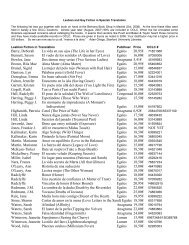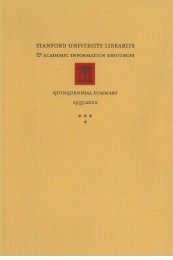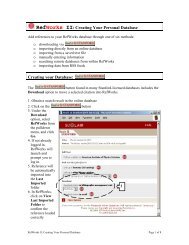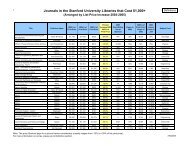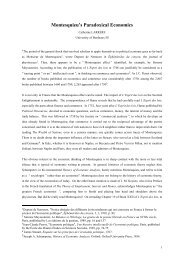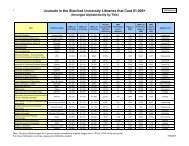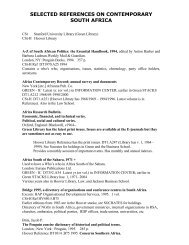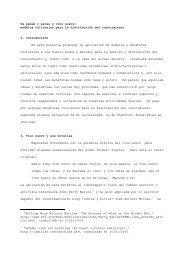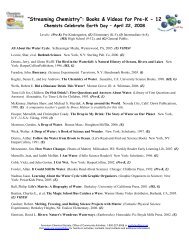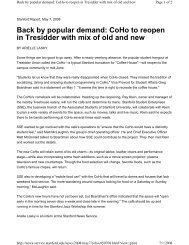The Abbé de Saint-Pierre and the Emergence of the 'Quantifying ...
The Abbé de Saint-Pierre and the Emergence of the 'Quantifying ...
The Abbé de Saint-Pierre and the Emergence of the 'Quantifying ...
Create successful ePaper yourself
Turn your PDF publications into a flip-book with our unique Google optimized e-Paper software.
Abbé <strong>Saint</strong>-<strong>Pierre</strong> <strong>and</strong> <strong>the</strong> “Quantifying Spirit” 4<br />
that <strong>Saint</strong>-<strong>Pierre</strong>’s “Bibliomètre” reveals how tightly his thought is intertwined with critical<br />
aspects <strong>of</strong> eighteenth-century thought.<br />
Seeing <strong>Saint</strong>-<strong>Pierre</strong> as a thoroughly banal thinker casts light on ano<strong>the</strong>r dimension <strong>of</strong> his<br />
thought -- <strong>the</strong> one upon which I want to focus here: his interest in numbers <strong>and</strong> quantification.<br />
John Heilbron, writing on behalf <strong>of</strong> a group <strong>of</strong> Swedish <strong>and</strong> American scholars, spoke in 1990 <strong>of</strong><br />
a “quantifying spirit” which permeated many areas <strong>of</strong> eighteenth-century intellectual life. 10<br />
While Heilbron’s work, <strong>and</strong> that <strong>of</strong> <strong>the</strong> scholars represented in <strong>the</strong> eponymous volume which he,<br />
Tore Frängsmyr <strong>and</strong> Robin E. Ri<strong>de</strong>r edited, is <strong>de</strong>voted primarily to <strong>the</strong> history <strong>of</strong> <strong>the</strong> natural<br />
sciences, <strong>the</strong> “quantifying spirit” which <strong>the</strong>y i<strong>de</strong>ntified can be seen as a crucial element in <strong>the</strong><br />
intellectual environment that influenced <strong>Saint</strong>-<strong>Pierre</strong>.<br />
Political economy, for example, emerges into its mo<strong>de</strong>rn form in <strong>the</strong> eighteenth century<br />
through a continual engagement with <strong>the</strong> new quantifying impulses <strong>of</strong> <strong>the</strong> period. From William<br />
Petty’s political arithmetic to Malthus’ quantitative <strong>de</strong>mography <strong>and</strong> Ricardo’s “iron law <strong>of</strong><br />
wages,” <strong>the</strong> so-called “dismal science” was born through a continual engagement with number,<br />
ma<strong>the</strong>matics, <strong>and</strong> <strong>the</strong> power <strong>of</strong> quantification. 11 <strong>Saint</strong>-<strong>Pierre</strong> was typically at <strong>the</strong> center <strong>of</strong> <strong>the</strong>se<br />
<strong>de</strong>velopments. He wrote extensively on Old Regime tax policy, <strong>the</strong> nature <strong>of</strong> commerce <strong>and</strong><br />
international tra<strong>de</strong>, <strong>and</strong> <strong>the</strong> foundations <strong>of</strong> agriculture <strong>and</strong> industry to name only a few <strong>of</strong> <strong>the</strong><br />
political economy topics he explored. He also applied his particular br<strong>and</strong> <strong>of</strong> quantitative<br />
thinking to each. “Bibliomètre” illustrates this convergence as <strong>the</strong> text shifts seamlessly between<br />
discussions <strong>of</strong> literature, science, <strong>the</strong> law <strong>and</strong> taxation all in <strong>the</strong> service <strong>of</strong> an overall argument<br />
about how to correctly measure <strong>and</strong> <strong>the</strong>n calculate <strong>the</strong> value <strong>of</strong> intellectual achievements.<br />
In <strong>the</strong> following two part discussion, I will <strong>the</strong>refore use <strong>Saint</strong>-<strong>Pierre</strong> to pursue a more<br />
general exploration <strong>of</strong> <strong>the</strong> early history <strong>of</strong> <strong>the</strong> quantifying spirit in French Enlightenment



